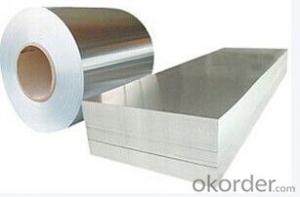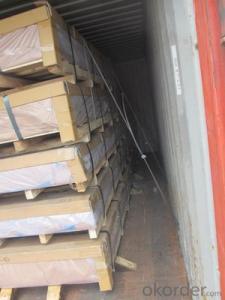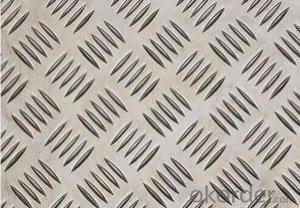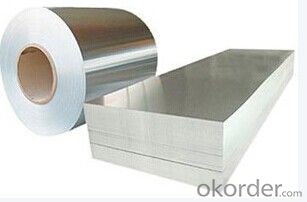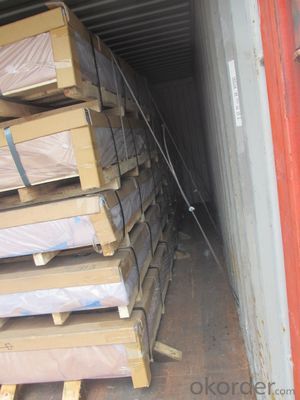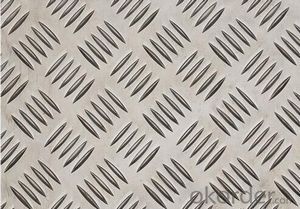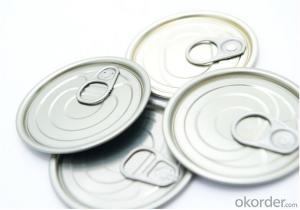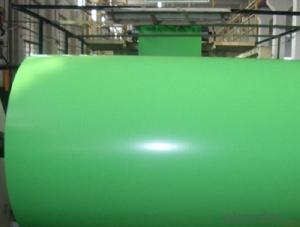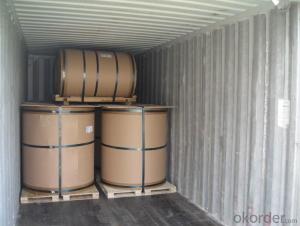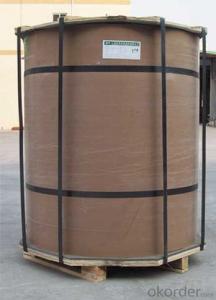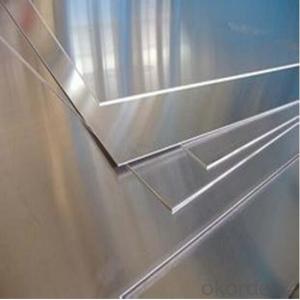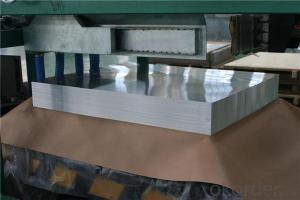AA 6061 Aluminum Coil Printing Sheet Suppliers on OKOrder
- Loading Port:
- China main port
- Payment Terms:
- TT or LC
- Min Order Qty:
- 1 m.t.
- Supply Capability:
- 3 m.t./month
OKorder Service Pledge
OKorder Financial Service
You Might Also Like
supply Mill-finished / coated aluminum plate/sheet/ coil:
Alloy: AA1050,1060,1100,1200,2024,3003,3304,3005,3015,5052,5086,5754,5083,6061,7050,7475,8011, etc
Temper: O, H14/16/18/22/24/32/ H112/H321/T6,T851,T7451,T7351, etc
Thickness: 0.02mm—20mm
Width: 100mm—2000mm (Can be slitted)
Notice: PE coating / PVDF coating / Embossment can be done if required.
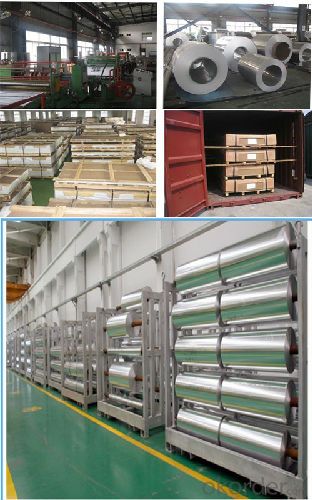
The occurrence of anode effects is because as the electrolysis process, oxygen-ion electrolyte gradually reduced, when a certain degree, there is precipitation of fluorine and carbon generate carbon anode effects fluoride, carbon fluoride in the decomposition time and fine carbon particles deposited on the carbon particles attached to the surface of the anode, electrolyte and anode to prevent contact of the electrolyte cannot properly wet the anode, like water cannot wet oiled surface as the electrolyte - anode formed between a bad air film conductive layer, the anode overvoltage increases, causing anode effect. When adding a new alumina deposited on the anode and oxygen, the reaction of oxygen and carbon black, the anode surface gradually quiet, resistance is reduced, the electrolysis process and become normal.
After 40 years of research and development, electrolytic coloring to keep the depth and breadth of development, anodized aluminum is developed from the general protective - decorative purposes to the functional film special physical and chemical properties, from single colored salt to mixed salt coloring, from single uniform color to multi-colored, multi-color sense, and so on. Current porous alumina membranes toward functional direction research mainly from two aspects, one is the use of its porous structure, the development of new ultra-precision membrane; the other is through their nanoscale pores of various deposition the nature of different substances, such as metal-semiconductor, polymer materials, to prepare a new type of functional materials.
- Q: What are the potential applications of coil-embossed aluminum coils?
- Coil-embossed aluminum coils have a wide range of potential applications due to their unique features and properties. Here are some of the potential applications: 1. Building and construction: Coil-embossed aluminum coils can be used in the construction industry for various purposes. They can be used as roofing materials, wall cladding, and exterior decorative panels. The embossed pattern provides aesthetic appeal and enhances the overall appearance of the building. Additionally, the corrosion-resistant properties of aluminum make it a durable choice for outdoor applications. 2. Automotive industry: Coil-embossed aluminum coils find applications in the automotive industry. They can be used for manufacturing body panels, trims, and decorative elements for vehicles. The embossed surface adds texture and style to the automotive components while providing durability and resistance to wear and tear. 3. Appliances and electronics: The embossed patterns on aluminum coils make them suitable for use in appliances and electronics. They can be used for manufacturing refrigerator panels, microwave casings, and other household appliances. The textured surface can also enhance the grip on handheld electronic devices. 4. Packaging industry: Coil-embossed aluminum coils have potential applications in the packaging industry. They can be used for manufacturing packaging materials such as cans, containers, and lids. The embossed surface can provide a unique branding opportunity, allowing companies to create visually appealing packaging designs. 5. Signage and advertising: The embossed patterns on aluminum coils can be utilized in the signage and advertising industry. They can be used for manufacturing outdoor signs, billboards, and display panels. The embossed surface adds depth and dimension to the signage, making it more eye-catching and attractive. 6. Furniture and interior design: Coil-embossed aluminum coils can be used in the furniture and interior design industry. They can be used for manufacturing decorative panels, furniture trims, and accents. The embossed patterns can add a touch of elegance and uniqueness to furniture and interior spaces. 7. Renewable energy: Aluminum is a lightweight and corrosion-resistant material, making it suitable for renewable energy applications. Coil-embossed aluminum coils can be used for manufacturing solar panels and wind turbine components. The embossed surface can enhance the efficiency of solar panels by increasing light absorption and reducing reflection. Overall, coil-embossed aluminum coils have a wide range of potential applications across various industries. The embossed patterns, along with the inherent properties of aluminum, make them a versatile material choice for both functional and aesthetic purposes.
- Q: Are there any restrictions on the coil flatness of aluminum coils?
- Yes, there are restrictions on the coil flatness of aluminum coils. The industry standards specify acceptable tolerances for coil flatness to ensure the quality and usability of the aluminum coils. These restrictions help prevent any deformation or irregularities in the coils, ensuring they meet the required specifications for various applications.
- Q: Can aluminum coils be used in aerospace applications?
- Yes, aluminum coils can be used in aerospace applications. Aluminum is a lightweight and durable material that offers excellent heat conductivity and corrosion resistance, making it suitable for various aerospace components like heat exchangers, condensers, and cooling systems. Its versatility and strength-to-weight ratio make aluminum coils a popular choice in the aerospace industry.
- Q: What is the elongation of aluminum coils?
- The elongation of aluminum coils refers to the amount of stretching or deformation that can occur in the material before it breaks or becomes permanently damaged. It is a measure of the ductility or ability of aluminum to withstand tensile forces without fracturing.
- Q: Is it possible to utilize aluminum coils for crafting artistic installations or distinctive creations?
- <p>Yes, aluminum coils can be used to create art installations and other unique creations. Their malleability, durability, and lightweight nature make them ideal for sculptural works. Artists can bend, shape, and weld aluminum coils into various forms, offering a wide range of design possibilities. The material's reflective surface can also add visual interest, especially when used in installations that interact with light and shadow. Additionally, aluminum's resistance to corrosion makes it suitable for outdoor art pieces, ensuring longevity and low maintenance.</p>
- Q: I was at an art festival and saw one of the most unique displays ever. The artist had painted abstract art on a piece of aluminum (or some type of aluminum type sheeting) I, being a novice artist for many years, was very intrigued and would LOVE to learn more about it. I've done searches on the internet, to no avail. Anyone have any ideas?
- I've known a couple of people who do this, you might try a search on Floating Panel. You could try to search out things on an artist called Gary Hume, as I know that his earlier paintings, certainly the ones for which he's known, were executed on aluminium. From what I remember of people doing this (some one on my MA made paintings on aluminium) the trick is in the priming, it being a non-pours surface. You need to rough the ground considerably and prime quite thickly. You also need to baton on the back, this will allow you to attach to the wall without ruining the face of the support, and prevent the possibility of warping. What looks great is if you recess the batons from the edge of the support, so that when against the wall they cannot be seen, this gives the appearance of hovering, and shows the thinness of your support. Another reason you might not be getting too many hits on your searches is the spelling, while not incorrect you might find art suppliers using the English, rather than the American spelling; aluminium rather than aluminum. I know that sounds petty but it might make a difference. The only other thing I know, while finding it a great surface to work on, smooth, bright, the artist I know also found it very expensive.
- Q: What are the different grades of aluminum used in coils?
- There are several different grades of aluminum used in coils, each with its own specific properties and applications. The most commonly used grades include: 1. 1000 series: This grade of aluminum is commercially pure and has excellent corrosion resistance. It is often used in applications where high corrosion resistance is required, such as in chemical processing equipment or marine components. 2. 3000 series: These alloys are known for their moderate strength and excellent formability. They are often used in cooking utensils, heat exchangers, and general sheet metal fabrication. 3. 5000 series: This grade of aluminum is known for its excellent weldability and corrosion resistance. It is commonly used in marine environments, as well as in transportation and structural components. 4. 6000 series: These alloys are known for their combination of strength, formability, and corrosion resistance. They are widely used in architectural applications, such as window frames, doors, and curtain walls. 5. 7000 series: This grade of aluminum is known for its high strength and toughness. It is often used in aerospace applications, as well as in sporting goods and automotive parts where strength is critical. These are just a few examples of the different grades of aluminum used in coils. The choice of the grade depends on the specific requirements of the application, such as strength, corrosion resistance, formability, and weldability.
- Q: Can aluminum coils be embossed or textured?
- Aluminum coils possess the capability to undergo embossing or texturing, thereby enabling the creation of patterns or designs on their surface. This can be achieved through mechanical or chemical processes. The resulting embossed or textured surface not only enhances the visual appeal but also improves the functionality of the aluminum coil, by augmenting its grip or minimizing glare. Consequently, these aluminum coils, with their embossed or textured features, have found widespread utilization across industries like construction, automotive, and packaging.
- Q: im melting aluminum and what should i use for metal. cans will just oxygenize( i forget the word for it sorry)
- aluminum, in general, will just oxidize if heated in air. it is not just cans that behave that way when they (alcan, alcoa) smelt aluminum industrially they keep it in a reducing environment and do not allow molten aluminum to contact air. so use any aluminum you like but prevent it from contacting air.
- Q: How do aluminum coils compare to other metal coils in terms of cost?
- Aluminum coils are generally more cost-effective compared to other metal coils. This is primarily due to the abundance of aluminum as a raw material and the relatively low cost of extraction and production processes. Additionally, aluminum coils offer a lightweight and durable solution, reducing transportation and installation costs. Moreover, aluminum is resistant to corrosion, which eliminates the need for frequent maintenance and replacement expenses. In contrast, other metal coils such as copper or stainless steel may have higher initial costs and require additional coatings or treatments to prevent corrosion. Therefore, when considering the overall cost, aluminum coils are often a more economical choice.
Send your message to us
AA 6061 Aluminum Coil Printing Sheet Suppliers on OKOrder
- Loading Port:
- China main port
- Payment Terms:
- TT or LC
- Min Order Qty:
- 1 m.t.
- Supply Capability:
- 3 m.t./month
OKorder Service Pledge
OKorder Financial Service
Similar products
Hot products
Hot Searches
Related keywords
